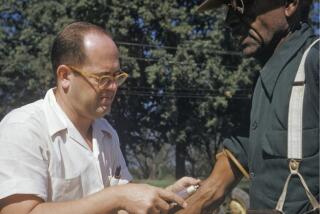Online harassment remains major problem, report finds
- Share via
Computers have the power to accelerate everything to the speed of light, even some of the most disliked human activities, according to a Pew Research Internet Project study that found that online harassment is endemic.
The study, released this week, found that 40% of those surveyed said they have personally experienced some form of online harassment, ranging from name-calling to stalking to sexual harassment to being physically threatened. More than seven out of 10 respondents said they had seen such harassment happen to others.
The figures get even more pronounced when broken down by age and gender. About two-thirds of younger Internet users, those between 18 and 29 years old, said they had been the target of online harassment, while 92% said they had witnessed such incidents, according to the report.
Men, at 44%, were more likely than women, at 37%, to experience at least one form of online harassment. But women 18-24 years old were more likely to experience certain severe types of harassment including 26% of young women who said they have been stalked online, and 25% who said they were the target of online sexual harassment.
In recent years, a rape case with online components in Ohio roiled a high school football team. Sexting, the transmission of nude photos, became a teenage fad as well as a weapon. It also toppled a New York congressman.
Online harassment, including its most sinister forms of cyber-bullying, have all too frequently become the stuff of which stars are made. Acclaimed actress Jennifer Lawrence was among those celebrities who had her nude photos stolen and posted online in a widespread hacking scandal in late August. Lawrence, 24, later told Vanity Fair that she considered looking at the stolen pictures a sex crime.
And in recent days, Monica Lewinsky, the White House intern whose sexual escapades with President Clinton led to the president’s impeachment in 1998, drew a standing ovation for a speech against cyber-bullying. She said she acted in part because of the 2010 death of Tyler Clementi, a Rutgers University student who committed suicide after intimate pictures of him were posted online.
Nor is it just the online version of bullying that is a problem. Studies show that between 20% to 30% of children say they have been bullied.
In 2004, the federal government launched its first anti-bullying campaign, timed for October, which ever since has been National Bullying Prevention Awareness Month to build awareness of the problem.
At times, the harassment has a political goal, as in the case of the so-called “Gamergate” campaign which has targeted several prominent women in the video game industry for how women are portrayed in games. One of the targets is Brianna Wu, a software engineer and founder of game developer Giant Spacekat. Wu, who is in her mid-30s, said she has frequently been harassed online, but that it’s gotten worse this year.
Earlier this month, people threatened her and her husband and posted her address online, she said. She got so frightened that she left her home in Boston.
Wu went to the police. That action is a rarity, though. According to Pew, just 5% of those who were harassed reported the incident to law enforcement.
The Pew telephone and online survey was conducted between May 30 and June 30 among 3,217 respondents. It has a margin of error of plus or minus 2.2 percentage points.
Follow @latimesmuskal for national news.
More to Read
Sign up for Essential California
The most important California stories and recommendations in your inbox every morning.
You may occasionally receive promotional content from the Los Angeles Times.














